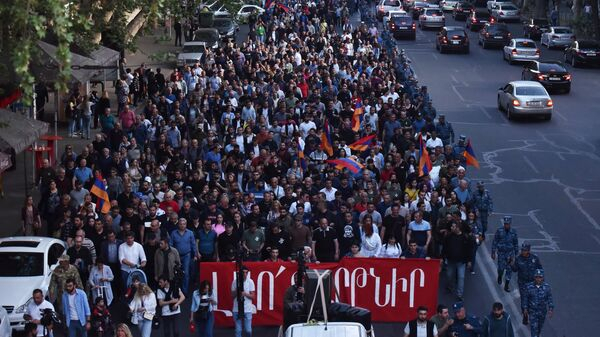// Protests in Yerevan don't aim to overthrow Pashinyan
By Vusal Mammadov
To understand the political mechanism of the protests held in Armenia, it is necessary to start from a brief chronology of events. The process started when following his visit to Brussels, during his speech at the Armenian parliament the Armenian Prime Minister said that the world community expected Armenia to recognize the territorial integrity of Azerbaijan and Turkey and “lower its bar on the Karabakh’s status”.
After that, it became clear that he was summoned to Moscow on April 19. While he was packing for his trip, Artur Vanesyan, the leader of the "With Honor" Faction of Armenia’s National Assembly announced the start of protests in Yerevan.
If a political figure, who is committed to Russia announces the start of protests, it means that the purpose is to pressure Pashinyan and render the fact that he will get in a difficult situation. Here, Artur Vanesyan’s identity becomes prominent. The biography of this political figure, who guides the new wave of protests against Pashinyan gives notice about some issues.
Scout doesn't become former
At famous Russian propagandist Vladimir Solovyov’s TV program, Artur Gagikovich Vanesyan, who was born in Yerevan in 1979 said: “I am a secret service agent. He graduated from Armenian Agricultural Academy in 1999 and Institute of International Economic Affairs of Saint Petersburg in 2003. Afterward completed the Academy of the FSB of Russia with distinction. Nevertheless, we cannot say why he was distinctive. Then he attended repetitive training at the Russian FSB.
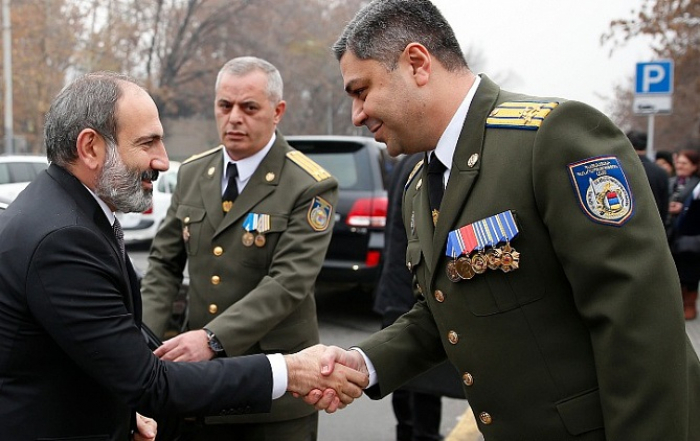
When Pashinyan came to power in May, 2018, Vanesyan was appointed as a director of the National Security Service. However, Vanesyan was forced to resign in September, 2019. There is no exact information about the reasons. However, one of the versions is that Vanesyan strongly adhered to pursue a direction that served Russia's interests within the ruling team. At that time, the second Karabakh War had not happened yet. Pashinyan openly chose a pro-Western direction.
Interestingly, following the statement signed on November 10, 2020, Vanesyan was arrested on charges of plotting assasination of Armenian PM Pashinyan.
During the snap elections in 2021,“With Honour” bloc, where Vanesyan was one of the leaders passed the line by 5,23 %. Thereafter, Vanesyan presented one of the major opposition blocs at the parliament.
At Solovyov’s program, when he was asked “Whose is Crimea?”, the former secret service agent answered as “Ours!..Thus, yours!”, considering Russia as major and close supporters of Armenia. However, it is true that there is no former scout. Especially, when it comes to Russian intelligence!
Option “B”
Of course, Vanesyan absolutely rejected any Russian influence on their protests: “Who is Russia to affect us? Russia is our strategic partner but why should it intervene in our internal affairs?” It is not difficult to understand that Vanesyan is option “B” of Russia in Armenia’s internal policy.
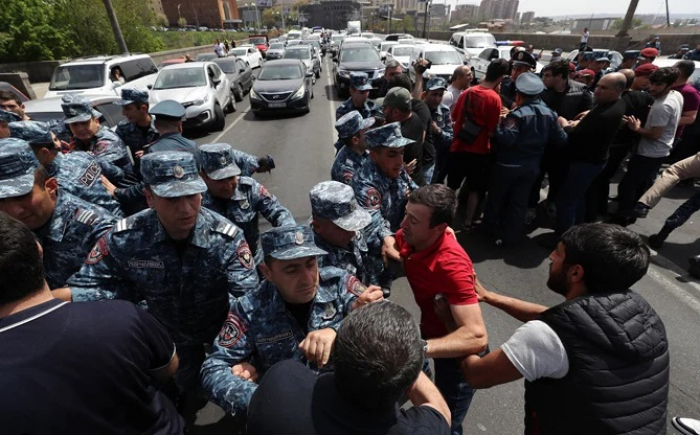
Option “A” - “Hayastan” bloc, formed on the basis of the former Karabakh clan also holds protest rallies. However, this force is so discredited itself that Moscow cannot have any serious hopes for it. Therefore, Vanesyan was brought to the fore. Although the leader of “Hayastan” faction Iskhan Sagatelyan said that he had plans to overthrow the power, they held parallel protests without joining Vanesyan's initiative. However, if the purpose was actually to overthrow the power, wouldn’t it be reasonable to unite the forces?!
“Layer cake”
One of the interesting aspects of these protests is that various classes came forward separately. As if the society is purposefully divided into segments to show that all these classes are against Pashinyan’s intention to compromise on the Karabakh issue.Let’s get to know the youth interested only in electric scooters and modern music, who are trying to make a fool of Pashinyan. Let’s get to know the mothers, who lost their children in the war, and the ex-soldiers, who went on an indefinite hunger strike. And everyone is protesting against possible “concessions”. Is it a little strange? Why should mothers who lost their sons protest against peace? Should other mothers’ sons die too? What is the goal of the defeated soldiers? Do they want the number of defeated soldiers and fugitives like them to increase?
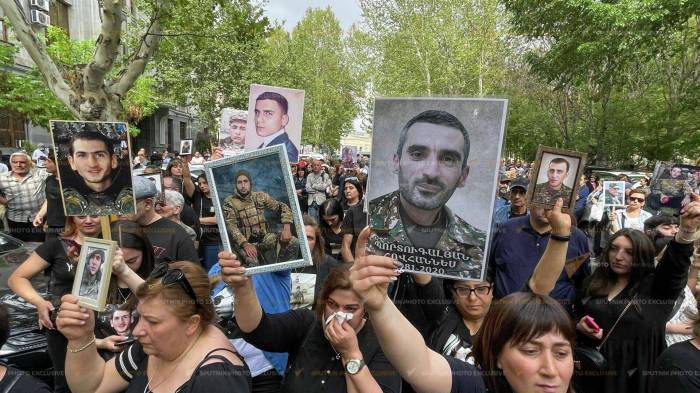
However, the main calls are aimed at young people, and they are actively involved in these processes. All this is a purposefully thought-out tactic. Unlike the middle-aged and older generation, young people are not overwhelmed by life and livelihood troubles but are more concerned about issues such as patriotism and national pride. Unlike the older generation who voted for Pashinyan despite his defeat in the war, the Armenian youth do not remember the tyranny of the ex-government well. But, at least, Pashinyan’s defeat made them feel humiliated. In other words, involving young people in dirty games is a very clever and cunning move.
Objectives
Vanesyan openly states that the Pashinyan administration has already begun to hint at the possibility of “Artsakh's” becoming part of Azerbaijan. “If we do not start a struggle inside Armenia and if we do not overthrow Pashinyan's government, this will become reality.”
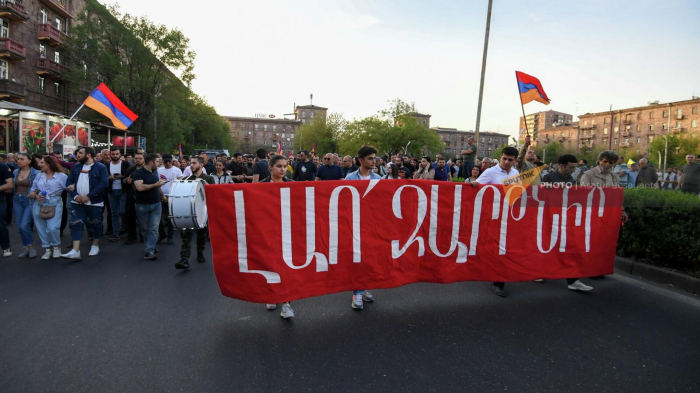
The goal of the protests is not to overthrow Pashinyan, but to prevent him from taking constructive steps towards a resolution in line with the Brussels scenario. It turns out that at the recent meeting with Pashinyan, Putin either did not hear the answers he wanted or even did not believe what he heard. That is why he began to “shackle” Pashinyan with internal protests.
Pashinyan’s phone talks with Araik Harutyunyan, head of the separatist group in Karabakh, both before and after his visit to Moscow, confirmed this factor. Most likely, Harutyunyan now acts as an indicator of Pashinyan’s compliance with the conditions set in Moscow. It is his opinion that will determine the next steps that Moscow will take concerning Pashinyan. The dynamics of internal political tensions - that is, protest rallies - will also depend on it.
The result remains unchanged
The settlement process will go on. The fact that on the days when protests were continuing in Yerevan – Azerbaijani President Ilham Aliyev’s talks with Special Representative of Russia’s Foreign Ministry for normalization of Azerbaijan-Armenia relations Igor Khovaev and Russian Deputy Prime Minister Alexei Overchuk on April 25 and 26 respectively confirmed this.
Igor Khovaev’s visit to Baku means, first of all, Russia’s renunciation of the Minsk Group in practice. If there is a special representative for the normalization of Azerbaijan-Armenia relations, the Minsk Group is automatically offside. It was stressed during the talks between Ilham Aliyev and Igor Khovaev that the preparation of a peace agreement between Baku and Yerevan should be based on the five principles presented by Azerbaijan. If the principles are clear, there is no work left for the mediators. This is a "red line" for Baku in general.
Alexei Overchuk is the person tasked by the Russian government to curate the activities of the Russia-Azerbaijan-Armenia trilateral commission and the unblocking of communications in the South Caucasus. His arrival in Baku suggests that Moscow intends to intensify its mediation following a hiatus since the meeting of November 2021. The matter is also about the opening of the Zangazur corridor. “A 60-kilometer section of the railway has already been built in Azerbaijan and will be completed next year. Azerbaijan is also progressing work on the construction of an automobile road under the plan. Unfortunately, no action has been taken by Armenia in this regard, as it has not yet determined the geographical coordinates of the highway route to pass through its territory,” President Aliyev told Overchuk.
Regardless of whether the settlement process is mediated by the West or the North, the result will not change: a peace treaty based on the "five principles", the opening of communications. This is the inevitable end and nothing can change it, including protests in Yerevan.
Vusal Mammadov is the editor-in-chief of AzVision.az








